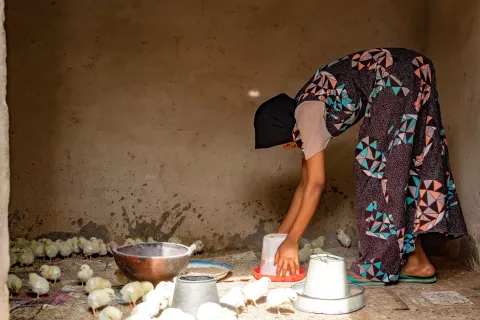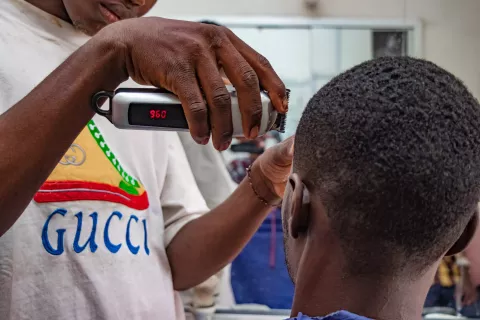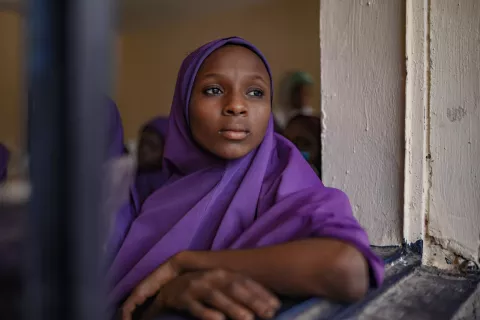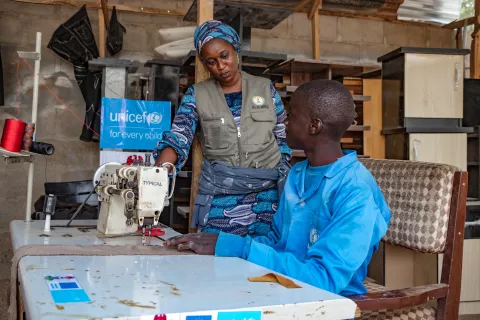Nigeria Takes Bold Steps to End Child Marriage and Protect the Rights of Children
Stakeholders Commit to Eliminating Child Marriage in Nigeria
Abuja, February 16, 2024 – Four out of every ten girls in Nigeria are married before the age of Eighteen. This was revealed at the high-level National Dialogue on Ending Child Marriage hosted by the Government of Nigeria and supported by UNFPA and UNICEF.
Child marriage remains a critical issue affecting the development and well-being of adolescent girls globally, with Nigeria ranking third in the prevalence of child brides. Child marriage prevalence remains high in the country, with 44% of girls married before the age of 18, totaling over 24 million child brides and ranking third globally. Although recent data suggests a decline in national prevalence from 44% to 30%, progress has been slow and uneven, particularly affecting the poorest households, rural areas, and girls with little or no education.
Recognising the urgent need to address this challenge, stakeholders from various sectors convened at the Child Marriage Stakeholders’ Consultations to deliberate on sustainable strategies towards ending child marriage in Nigeria.
At the end of the event, the stakeholders have committed to ending child marriage in Nigeria by 2030 through collective action, deepened collaboration, and the deployment of additional policies and resources at the federal, state, and community levels.
"Child marriage violates the fundamental rights and freedoms of young girls. The collective action and unwavering commitment of government officials, community and religious leaders, civil society organizations and every Nigerian is required to end this harmful practice" said Dr. Gifty Addico, UNFPA Resident Representative
"In addressing the challenge of child marriage in Nigeria, we stand with our partners and commit to a strategic and united effort to eradicate this practice by 2030. We reaffirm our pledge to elevate the status and well-being of girls, ensuring their rights to education, health, and economic opportunities are preserved. Child marriage not only impacts their well-being but can also cause grave emotional and bodily harm. It is a practice that must be stopped," said Ms. Cristian Munduate, UNICEF Representative.
The National Dialogue represents a significant stride towards eradicating child marriage in Nigeria by fostering collaboration among diverse stakeholders to achieve Sustainable Development Goal 5.3, which targets the elimination of child marriage by 2030. It sets the stage for the forthcoming review and development of a new National Strategy and a cost-effective action plan on Ending Child Marriage in Nigeria by 2030 and reinforces previous interventions aimed at ending child marriage and giving girls a brighter future.
At the conclusion of the National Dialogue, UNFPA and UNICEF successfully brought together key stakeholders, resulting in several positive outcomes, such as:
- A cohesive front was formed, and an approach was developed against child marriage, leading to a collaborative effort to shape a brighter future for Nigerian girls.
- Support was garnered for the National Strategy and cost-effective action plan, laying the foundation for meaningful progress in ending child marriage in Nigeria by 2030.
- Community-driven solutions and strategies emerged, resulting in increased support for ending child marriage. This led to a cultural shift, challenging traditional norms and beliefs that perpetuate child marriage and creating a supportive environment for girls.
- Commitments for resource mobilisation increased from both national and international donors to implement the interventions outlined in the action plan.
Media contacts
About the UNFPA-UNICEF Global Programme to End Child Marriage
The primary goal of the Global Programme is to contribute significantly to the realisation of SDG target 5.3, both directly in the 12 Global Programme countries and indirectly in other countries influenced by the Global Programme methodology, technical resources, data, evidence, and knowledge. The Global Programme, in its third phase (2024–2030), aims to support governments and civil society partners, including women- and youth-led organisations and feminist movements, to accelerate action to end child marriage. At the heart of the theory of change is an adolescent girl-centred approach that aims to empower individual adolescent girls to make decisions about if, when, and whom to marry, within a web of support that involves her family, the community (including boys and men), service providers, society, and public structures, institutions, systems and services, laws, and policies. Nigeria has been recognised as a rising star to end child marriage and will hopefully be included in the Global Programme soon.




